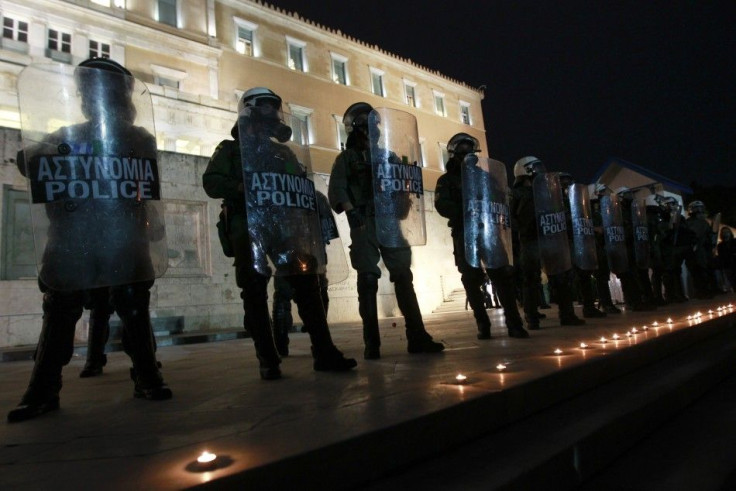'Greek Martyr' Dimitris Christoulas: 5 Things To Know About The Man Who Committed Suicide Over Austerity

Greek Martyr Dimitris Christoulas has become the face of the movement opposing the harsh austerity measures that have been foisted upon Greece's people as the country's economy has fallen off a cliff over the past couple of years.
Christoulas reportedly shot himself in the head Wednesday in front of the Greek parliament, after announcing that his financial woes had brought him to take his own life, shocking the nation and launching a new wave of anti-austerity protests.
He has become known as the Greek martyr, as his public suicide resonated with many Greeks who have seen their financial futures, and those of their elderly relatives, decimated by punitive austerity measures.
Here's 5 things to know about Greek martyr Dimitris Christoulas:
1. What drove him to suicide: Dimitris Christoulas did not come to suicide on a whim, and he did not take his life in a way that would be forgotten, instead ensuring that the world would see his pain. The 77-year-old retired pensioner and retired pharmacist wrote in a suicide note that he would rather take his life than have to scavenge for food in order to survive, according to Reuters.
2. He has become a national hero overnight: Just one day after his suicide, Greek Martyr Dimitris Christoulas has become a national hero, leading protesters to take to the streets and fight against riot police in order to get out their message of opposition to the harsh austerity regime. Greek sympathizers also set up a shrine on the site of his death, Reuters reported. On Thursday, the shrine was swarmed by dozens of Greeks, who left flowers, candles and more, while protesters planned another day of resistance.
3. He comes from a long tradition of revolutionary sacrificial lambs: Dimitris Chistoulas is not the first person to use self-sacrifice as a means to bring attention to a pressing social issue. Self-immolation is an extreme form of such action that has been used to great effect in order to draw attention to such offenses as the discriminatory treatment Buddhists received in South Vietnam during the early 1960s. It has also been used at least as recently as last week in order to draw attention to the harsh Chinese rule over Tibet. And the famous self-immolation of Mohamed Bouazizi in 2010 as a means to draw attention to economic inequity in Tunisia is known as the moment that sparked that country's awakening and the Arab Spring.
4. The background behind his nickname: The Greek martyr Dimitris Chistoulas earned that moniker quickly after his suicide, as people took to the streets to make sure the message of his death was heard loud and clear around the world. But it was set down on paper in the conservative newspaper Eleftheros Typos, which dubbed Chistoulas a martyr for Greece, according to Reuters, and went on to say that his suicide could shock Greek society and the political world and awaken their conscience.
5. What Greeks are saying about his death: The response of ordinary Greeks who remain alive in a country gripped by economic turmoil has consisted mainly of outright condemnation of the authorities and circumstances that led the country to its current low station It's horrible. We shouldn't have reached this point. The politicians in parliament who brought us here should be punished for this, Anastassia Karanika, a 60-year-old pensioner, told Reuters, which reported that at least four people have tried to commit suicide this week in response to their financial woes. And Christoulas and the other potential suicidees may end up being a major factor in the country's coming election, as candidates seize on it to cast dispersion on their political foes: Those who should have committed suicide - who should have committed suicide a long time ago - are the politicians who knowingly decided to bring this country and its people to this state of affairs, Panos Kammenos, a conservative lawmaker, told Reuters.
© Copyright IBTimes 2024. All rights reserved.



















